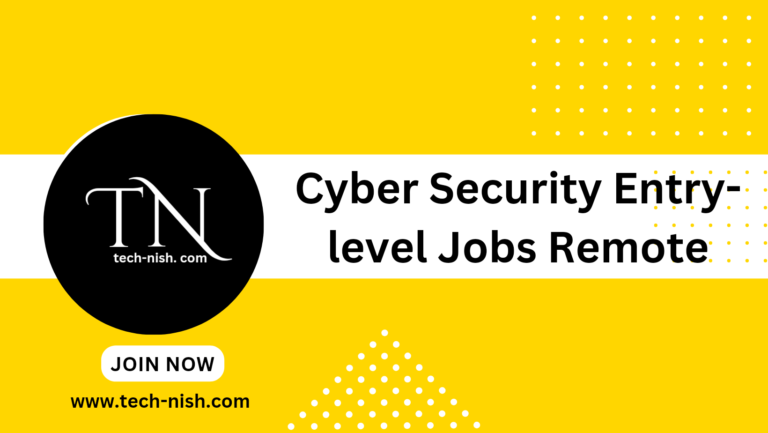Cyber security entry-level jobs remote
In the present computerized age, where innovation assumes an essential part in each part of our lives, the interest of network protection experts is on the ascent. This developing requirement for network safety specialists has prompted plenty of section-level remote open positions. Whether you are enthusiastic about safeguarding computerized resources or are thinking about a professional change, distant passage-level situations in network safety are a promising door into this thrilling field. Cyber security entry-level jobs remote are outstandingly described below.
Table of Contents
Why Cybersecurity?
Online protection is a fundamental space for defending associations, people, and society all in all against digital dangers. With the rising dependence on innovation, the requirement for network protection experts has never been more prominent. Passage-level positions are plentiful as well as propositions promising vocational prospects and professional stability. Cyber security entry-level jobs remote
Benefits of Remote Work:
- Flexibility: Remote work offers employees the flexibility to set their own schedules, allowing them to better balance work and personal life. This flexibility can lead to improved job satisfaction and reduced stress.
- Cost Savings: Both employees and employers can benefit from cost savings associated with remote work. Employees save on commuting expenses, work attire, and daily meals, while employers can reduce overhead costs related to office space and utilities.
- Improved Work-Life Balance: Remote work often leads to a better work-life balance, as employees can spend more time with their families and pursue personal interests without the constraints of a traditional office schedule.
- Expanded Talent Pool: Employers can access a wider talent pool when hiring remotely. They are not limited to candidates in their geographic area and can recruit the best talent regardless of location.
- Increased Productivity: Some employees find they are more productive when working remotely due to reduced office distractions, quieter environments, and the ability to structure their workday to suit their peak productivity times.
- Reduced Commute Stress: Eliminating the daily commute can reduce stress and the time spent in traffic, leading to a more relaxed and healthier workforce.
- Environmental Benefits: Remote work can contribute to a decrease in carbon emissions and a smaller ecological footprint, as it reduces the need for daily commuting and office energy consumption.
- Better Health and Well-Being: Remote work can lead to improved physical and mental health for employees. It reduces exposure to workplace illnesses, allows for more regular exercise, and reduces stress associated with office politics.
- Access to a Global Workforce: Companies can tap into a diverse global workforce, which can bring a variety of perspectives, skills, and experiences to the organization.
- Business Continuity: Remote work can be a crucial component of a business continuity plan. It allows companies to maintain operations during unforeseen events, such as natural disasters or pandemics.
- Reduced Turnover: Offering remote work options can improve employee retention by providing a perk that many value. It can also reduce turnover costs for employers.
- Customizable Workspaces: Employees can create workspaces that are tailored to their preferences, leading to increased comfort and productivity.
- Work-Life Integration: Remote work allows for a more integrated approach to work and personal life, where both aspects can coexist harmoniously.
- Increased Job Satisfaction: Many remote workers report higher job satisfaction due to the benefits of remote work, such as flexibility and reduced stress.

Entry-Level Remote Cybersecurity Jobs:
- Security Analyst: As a passage-level security expert, your job includes checking networks for security breaks, examining information for expected dangers, and aiding occurrence reactions. This position is an incredible beginning stage for newbies to the field.
- Security Operations Center (SOC) Analyst: SOC analysts are responsible for real-time monitoring and analysis of security alerts. They play a crucial role in identifying and mitigating threats.
- Security Consultant: As a security consultant, you’ll work with associations to survey their security pose, suggest upgrades, and assist with executing security arrangements. Section-level positions normally include a ton of learning and cooperation with experienced experts.
- Cybersecurity Intern: Many organizations offer far-off temporary positions for those hoping to acquire active involvement with online protection. These temporary jobs can act as a venturing stone to a full-time position.
- Incident Responder: Occurrence responders are answerable for examining and moderating security episodes. This job can be both energizing and testing, making it an extraordinary choice for those looking for active involvement with network safety.
Skills and Qualifications:
- Education: A bachelor’s degree in a related field, such as computer science or information security, is often required, but some positions may accept certifications or relevant coursework.
- Certifications: Obtaining certifications like CompTIA Security+, Certified Information Systems Security Professional (CISSP), Certified Ethical Hacker (CEH), or Certified Information Security Manager (CISM) can greatly enhance your credentials.
- Technical Skills: Familiarity with network and system administration, knowledge of cybersecurity tools and technologies, and coding skills can make you a strong candidate.
- Soft Skills: Strong analytical, problem-solving, and communication skills are essential in cybersecurity, as is the ability to work both independently and as part of a team.
Platforms for finding cybersecurity jobs
- LinkedIn: LinkedIn is a valuable platform for professional networking and job searching in the cybersecurity field. LinkedIn is the best platform for Cyber security entry-level jobs remote. You can follow cybersecurity-related groups and companies, connect with professionals, and receive job recommendations. LinkedIn
- Indeed: Indeed is a popular job search engine that aggregates cybersecurity job listings from various sources. It allows you to search for cybersecurity jobs, set up job alerts, and apply directly through the platform. Indeed is also top level for Cyber security entry-level jobs remote.
- Glassdoor: Glassdoor offers not only job listings but also company reviews and salary information. You can search for cybersecurity positions, research potential employers, and read reviews from current and former employees. Glassdoor
- Dice: Dice is a specialized job board for technology and cybersecurity professionals. It provides a wide range of IT and cybersecurity job listings, and you can set up job alerts tailored to your preferences. Dice
- CyberSecJobs: This platform focuses exclusively on cybersecurity jobs and provides a targeted job search experience. You can search for positions, upload your resume, and receive job alerts. CyberSecJobs
- Monster: Monster is another widely used job search platform featuring a variety of job listings, including those in the cybersecurity field. You can search for jobs, create a profile, and set up job alerts. Monster
- USAJobs: If you’re interested in cybersecurity jobs within the U.S. federal government, you can explore the USAJobs website, which is the official portal for federal job listings. USAJobs
- (ISC)²: The (ISC)² website offers career resources and job listings related to information security and cybersecurity. It’s a valuable resource for those pursuing careers in this field. (ISC)²
- ISACA: ISACA is a professional association for information systems and cybersecurity professionals. Their website includes job listings and resources for those seeking cybersecurity careers. ISACA
- CompTIA: CompTIA, a well-known IT certification organization, provides career resources and job listings for IT and cybersecurity professionals. CompTIA
When using these platforms, remember to tailor your job search with relevant keywords to find specific roles that match your skills and interests. Keep your resume and LinkedIn profile updated to enhance your visibility to potential employers. Cyber security entry-level jobs remote, I hope you guys get the proper guidelines what you need to do
Learn more about Cyber Security Here…
